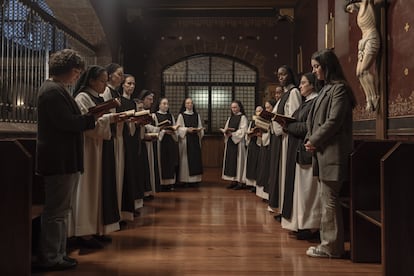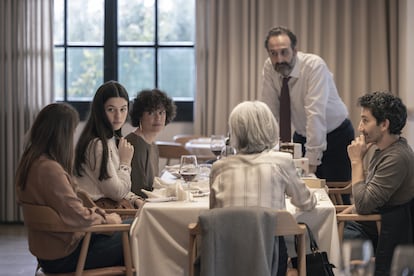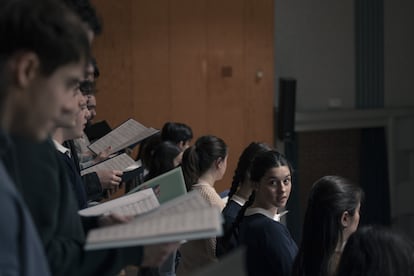From one family, the blood, to another family, the spiritual. From the point of view of a teenager who feels a call to the life of closing and religiosity, to the point of view of those around her, aunts, sisters, friends, sisters or father, who project in her her own joys and her own miseries. Everything fits Sundays, The slap that Alauda Ruiz de Azúa sticks to each spectator with a premise: a 17 -year -old girl announces that she wants to enter a closing convent. And now what? Do we respect the free will? Do we think that they have indoctrinated or has faith and has felt the call? Those who surround the teenager, do their decisions thinking about her or project her great fears in her opinions? That is what Ruiz de Azúa responds with a portentous, immense work, transparent in his complexity and joyful in his pain.
How easy it would have been to use the fat brush to talk about nuns and vocations. Or define from the beginning what is sect and what is pure and true religion. If Spain itself has not yet decided to bet on erecting itself as a secular state and still allows the Catholic Church to permeate in official institutions, what will the family of a 17 -year -old girl who want to enter a closing convent?
Because, in addition, the Basque filmmaker knows how to build a breeding ground measured in her ingredients to cook her drama: the protagonist is a mother orphan, along with her two small sisters she lives more vigilated and educated by her grandmother and her aunt than by her father, who struggles to get a restaurant. She is a shy, very intelligent girl, with friends, who is doing well in her religious school and in the choir, projecting before the outside a stereotyped image of good adolescent in a middle-high-class family in the most bourgeois Bilbao.
Until the bomb arrives: the girl wants to be a nun. Go for God. And the ruins, the silences and the family meanness, placed in the family meals of Sundays, assault the day to day. The aunt (Patricia López Arnaiz, not a bad movie) warns: they have indoctrinated it, they are taking it. The father (immense in his silence Miguel Garcés) Atempera, must be respected, advises, while hiding other emotional letters that underpin his decision. The machinations of both do not take into account the protagonist, and the narrative advances at a blow of Nordic dryness, because how Ruiz de Azúa the conversations at family tables!

In To want, The previous work of the director, in series format, a son of the woman who denounces the eternal abuse of her husband sparkled her brother that her room gave wall with a wall with that of her parents, and that he had not heard that pain. In that phrase, Ruiz de Azúa warned: each one moves by a truth, another thing is what is true. In Sundays Cava deeper in that line of work: everything is manipulable, everything can be seed of Manichaeism, everything is uncomfortable. If the public faces Sundays And the intangible of spirituality from its own belief system, the film will give an answer to your liking. But if he sits before her actively, understanding that life is complex, intriguing, and bitch and exciting, and carnal and spiritual, the film trip will be much more enriching.

Ruiz de Azu Basque It is based on who Euskera speaks – supporting each sequence with a script in which each word, each line, matters. In its stealth is its forcefulness, in its formal finesse is the emotional storm, its austerity is born from purification.
For decades Spanish cinema has portrayed nuns since the most timorarate respect for more delusional irreverence. What is lived hidden awakens curiosity so we have traveled by Sor Citrén, Extramuros, between darkness, cradle song, the call, Verónica, death sister … The approach of Sundays It is novel, because not all nuns, like faith, are the same and, therefore, their vocations are different. Five lobitos It advanced as if it were a breakwells: the trip was necessary, imperative, but did not attend to deviations. To want He also sailed to a port, although in that development Ruiz de Azúa considered that it was worth traveling intermediate stages. In Sundays It shows the map to the public, gives the compass and withdraws: that the spectator Espabile.

And after all the above, Ruiz de Azúa, who is trying these days in San Sebastián not to give a headline that dynamite its film commitment, still performs two magic tricks. With one, the superlative construction of Nagore Aranburu of a superior mother, loving with whom they surround her, sibyline with whom they attack her, finishes the building. With another, a camera movement that absorbs as if it were a hurricane to the protagonist, leaves the audience without breathing. In the coming months it will also be released Sentimental Value, by Joachim Trier, a film with obvious parallels in background and form with Sundays, And that is also launched to rush end. Anyway, how can a movie that uses as an emotional hinge be bad Into My Arms, de Nick Cave and The Bad Seeds?

